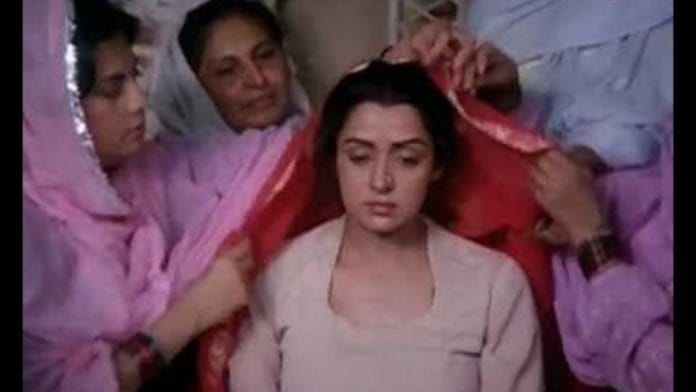Ek Chadar Maili Si’ isn’t your regular 80s Bollywood film with disco beats and masala action. It’s unsettling, and uncomfortable.
It’s an experience soaked in the dust of rural Punjab, in the deep, dark folds of patriarchy and age-old traditions.
Based on Rajinder Singh Bedi’s Urdu novel of the same name, the 1986 film adaptation directed by Sukhwant Dhadda is a portrayal of a woman’s bruised dignity and the silent scream of suppressed rebellion.
Set in a conservative Punjabi village, Ek Chadar Maili Si follows the story of Rano (Hema Malini), a strong woman trapped in a rigid patriarchal setup. She’s married to Trilok (Kulbhushan Kharbanda), a drunkard who beats her, humiliates her, and dies a gruesome death.
What should have been Rano’s escape from abuse quickly turns into a new trap.
Trilok’s death brings shame and dishonour to Rano. The only way to ‘cleanse’ the stain, according to the panchayat, was to force Rano to marry her much younger brother-in-law, Mangal (Rishi Kapoor), who is in love with Raaji (Poonam Dhillon)
This practice, known as chadar dalna (placing a sheet over her), is literal and symbolic – she is once again covered by the same suffocating cloth of societal expectations.
A ‘chadar’ of misogyny
At its core, Ek Chadar Maili Si is a gut-wrenching commentary on how society uses tradition as a tool for female oppression.
Rano doesn’t just wear a stained sheet – she becomes one.
Exploited, passed around, denied identity, and forced to exist only to serve a role assigned by others.
The age gap between Rano and Mangal is not just a detail – it is a deliberate discomfort.
Their physical and emotional relationship seems unnatural. And the film doesn’t romanticise it – it lets it be as dissonant as it should feel.
In a way, the film is also about silent rebellions.
Rano never delivers fiery monologues, but her refusal to collapse, to keep standing, even as everyone wants her to fold – that’s her protest.
Also read: Jaya Bachchan made Mili unforgettable. Her acting rivalled Rajesh Khanna’s in Anand
Performances
Hema Malini’s Rano is raw and bruised — emotionally and physically.
Be it when drunkard Trilok abuses and beats her, when his dead body is brought to the house, or when she is forced to marry Mangal — Rano doesn’t cry out for pity. She seethes in silence, and you feel every bit of that rage, helplessness, and reluctant submission.
There’s no over-the-top melodrama – just quiet, deep human suffering and strength.
Malini steps out of her dream-girl image, embracing the role of a rural Punjabi woman, who despite being on the receiving end of abuses from her husband, mother-in-law and society, still isn’t kind to her own daughter.
This also represents the baggage of emotional trauma passed down from mothers to their daughters — generation after generation.
Kulbhushan Kharbanda is repulsive and effective as the violent, unredeemable husband, Trilok.
Rishi Kapoor, as Mangal, is surprisingly good. He shed his chocolate-boy image to play the rustic and carefree character, who evolves through the film to become a responsible man. Though Kapoor handled the transition with sincerity, it was Hema Malini who did the heavy lifting in terms of connecting with the audience.
The film doesn’t soften the blows for the viewer – neither metaphorically nor literally.
The oppressive mood, the moral policing, and the suffocating burden of customs are laid out with raw honesty.
The screenplay, co-written with Rajinder Singh Bedi, retains much of the original novel’s realism.
The visuals are dusty, muted, and grounded. The camera lingers on narrow alleys, cracked mud walls, and unsmiling faces. Silence is used as a weapon.
There are long, uncomfortable pauses, muted dinners, and glances that sting.
It is not what the characters say but what they cannot say that becomes the core of the film.
Stained sheet, clean truth
Ek Chadar Maili Si looks at the ugliness beneath the so-called cultural sanctity. It’s bold for its time – and still relevant.
In a country where women are still taught to ‘adjust,’ ‘sacrifice,’ and ‘preserve family honour,’ this film hits home harder now than it probably did in 1986.
It isn’t easy to watch – but that’s precisely why you should. It’s slow. It’s heavy and doesn’t offer a satisfying climax or redemption arc.
But that’s the point. Life, especially for someone like Rano, doesn’t offer neat endings. It drags on, tainted, just like the sheet in the film’s title.
(Edited by Ratan Priya)






